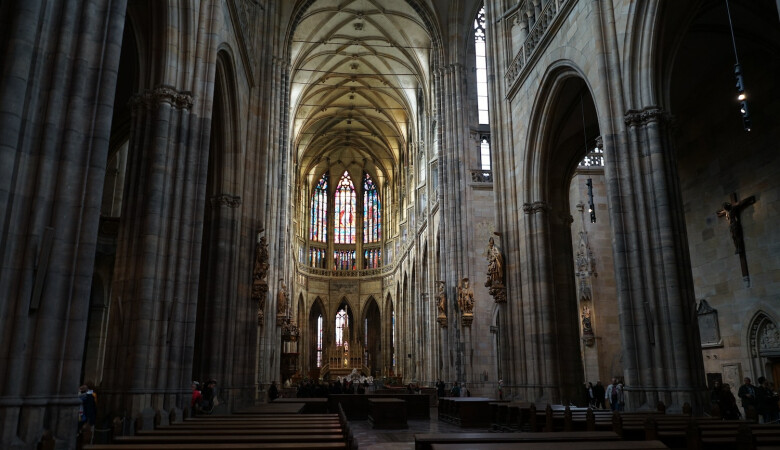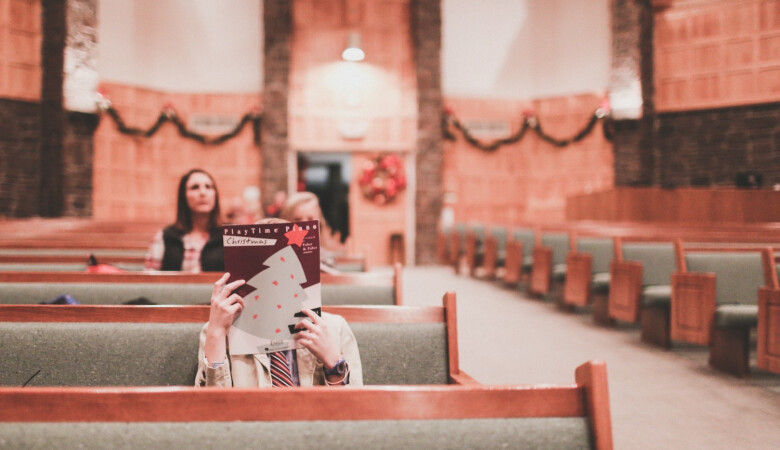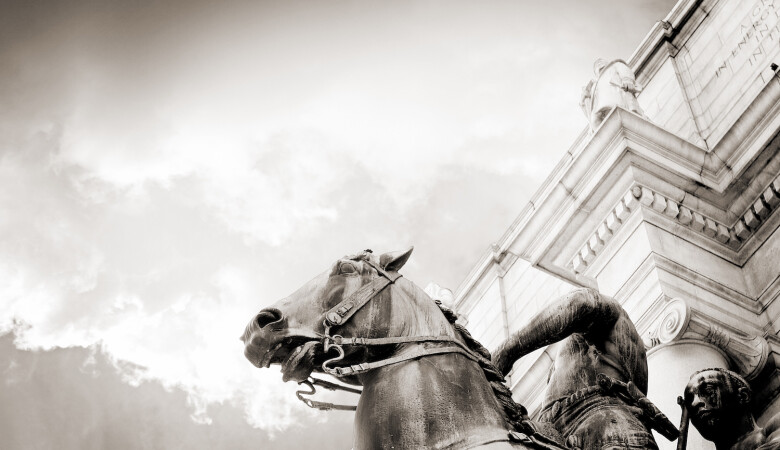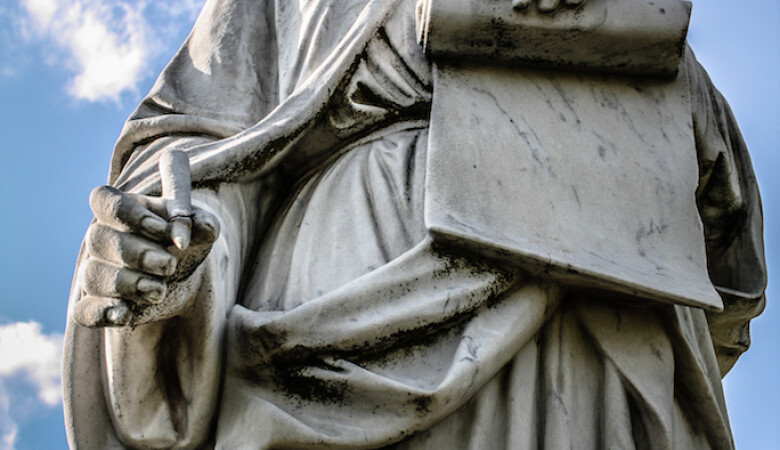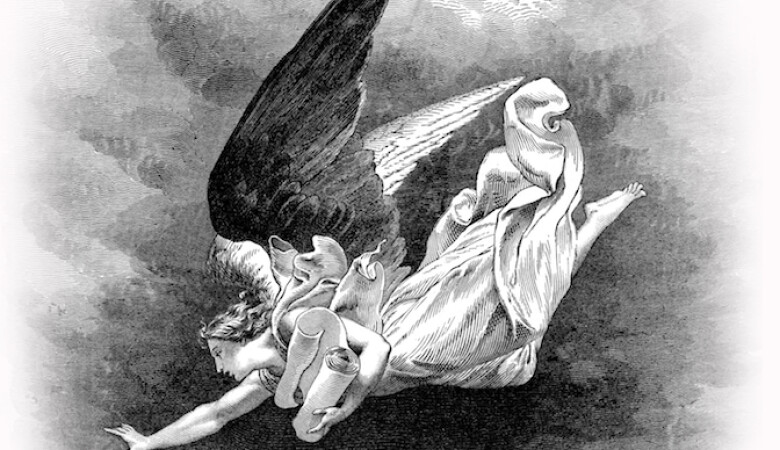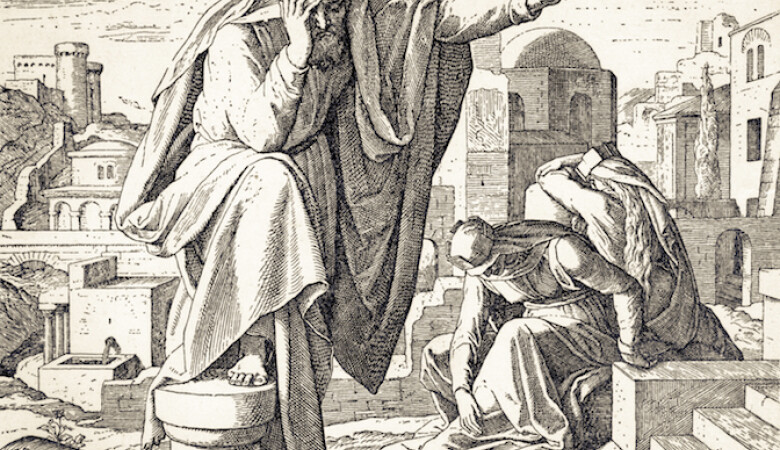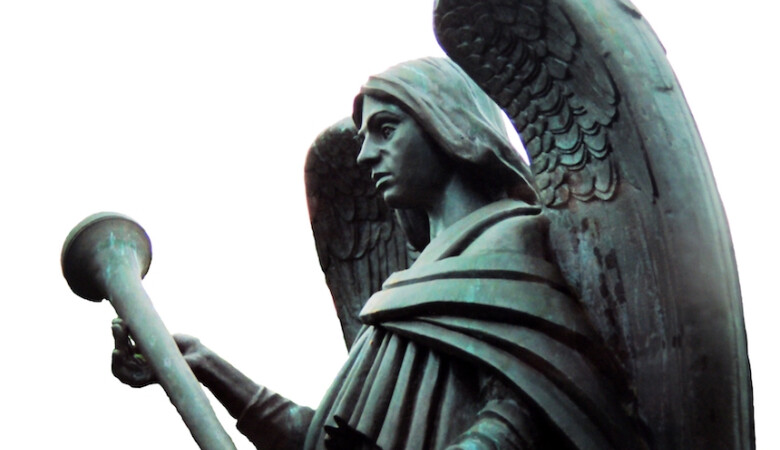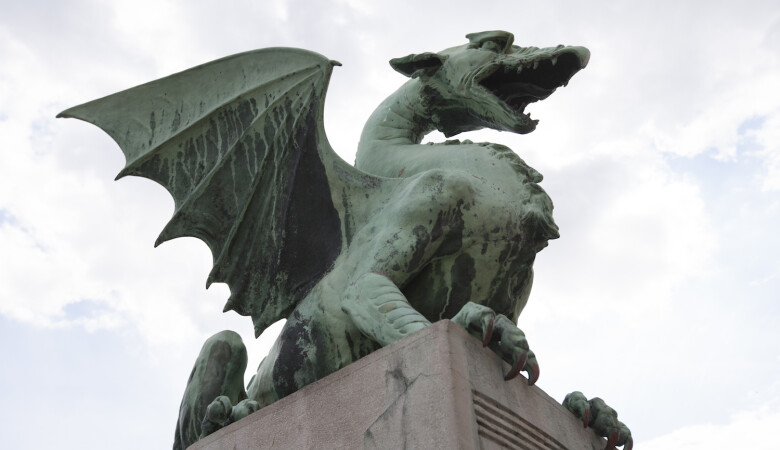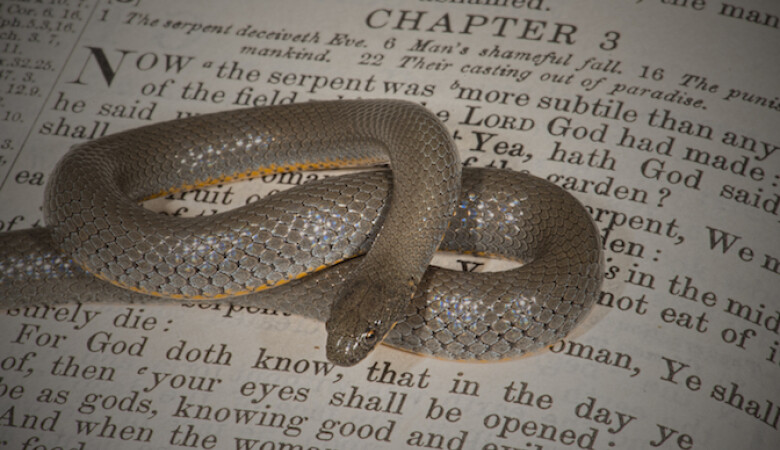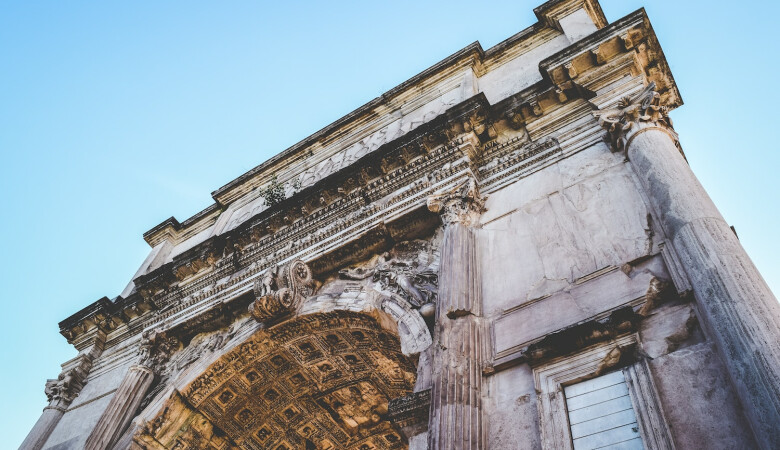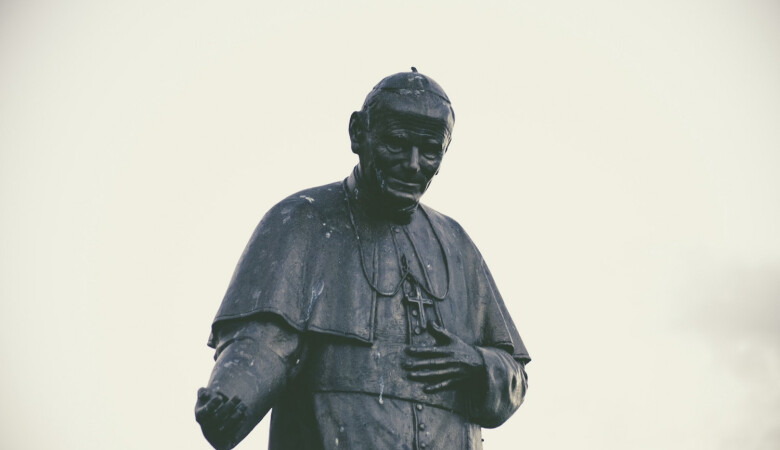The Lamb on the Cross Has Become the Lion on the Throne (Revelation Sermon 10 of 49)
May 14, 2017 | Andy Davis
Revelation 5:1-13
Exaltation of Christ
I. Introduction
The Psalmist says, “O magnify the Lord with me, let us exalt His name together.” The word “magnify” means “to appear to make greater”. We may well wonder how we can possibly make an infinitely majestic God greater or glorify Him in any sense of adding to His glory — of course we cannot do that. In the 17th century, when Galileo viewed Saturn and its rings through his telescope, he did not make Saturn any bigger or do anything do anything to add to what it already was. However, it appeared far greater to him. He was able to partake of the breathtaking beauty and then study the details because of the instrument he used to view it. In the same way, we can think of the Word of God like a telescope: through exegesis, through study of nouns and verbs and paragraphs, God’s Word allows us to view the glory of Christ. We see through a glass darkly, not clearly and perfectly like we will someday, but better than without it. My goal today is to magnify and exalt the name of Christ together with you, to make Him appear greater to all of us.
I believe I can safely say that there is not one person here today who has a proper estimation of Jesus, even among those who have been believers with a healthy Christian walk for dozens of years, even decades. We all underestimate Jesus. It is my privilege to help all of us estimate him in His true worth a little bit more with each sermon I preach, to enable you to see His greatness and majesty. There are few chapters equal to Revelation 5 to do that for us.
As we began last week, we will continue following the Apostle John from the rocky island of Patmos off the coastline of modern day Turkey in the Aegean Sea. He was in the Spirit on the Lord's Day, and he heard a voice behind him commanding him to come up to where the voice was speaking from. He had no natural ability to obey, but as he was lifted up, he saw a doorway standing open in Heaven.
Revelation 4:1-2 speaks of this Spirit flight: “After this I looked, and there before me was a door standing open in Heaven. And the voice I had first heard speaking to me like a trumpet said, ‘Come up here and I will show you what must take place after this.’ At once I was in the Spirit, and there before me was a throne in Heaven with someone sitting on it.”
We will continue following John by the ministry of the Spirit, by the ministry of the Word of God, through the inner eye of faith up into that Heavenly court. We will see the throne of God, and Almighty God Himself seated on His throne. We will also see the resurrected, glorified Christ in His victory over sin and death right there in the throne room of God.
Last week we began by unfolding a scene of the surpassing greatness of Almighty God, the creator of Heaven and Earth, seated on His throne. Surrounding that throne were twenty-four other thrones with elders seated on them. There were four living creatures surrounding the throne as well, continually — day and night — worshipping Almighty God. As we saw last week, the focus in Revelation 4 is on worship of God, the Creator: “Worthy are you, the creator of all things, because you created all things and by Your will, they were created and have their being.” In Revelation 5, the focus is on worship of Christ the Redeemer.
When we step back with these two emphases in mind, we see that Revelation 4-5 should be seen together as one vision. They provide a helpful theological division of God the Creator and Christ the Redeemer, which enhances our understanding of the worth and value of God in that division.
As we look at Revelation 5, four things will focus our attention: first, the scroll in the right hand of God; second, the proclamation of the mighty angel about that scroll; third, the lamb receiving the scroll; and fourth, the honor and glory given by all creation to the lamb because of the scroll.
II. The Scroll: God’s Plan for Redemption and Judgment for the Earth
The Scroll Described
Verse 1 says, “Then I saw in the right hand of Him who sat on the throne a scroll with writing on both sides, sealed with seven seals.” The Greek word for scroll is biblos, from which we get Bible or bibliography — in modern terms, we would translate it as “book”, but most likely, it was a rolled-up scroll. This scroll was in the right hand of the one who was seated on the throne, the ruler of the universe who is God Almighty, God the Father, God the Creator of the ends of the earth. John saw Him seated on a throne proclaiming His sovereign right to rule over all the universe. He is absolutely sovereign over Heaven and Earth, and He is sovereign over the events of Heaven and Earth as well. Not only did He originally create all things, but by His will and by His word, they are continually upheld in their creation. Creator God makes a continual decision and commitment to keep them existing. There is no independent existence from this Creator God, even now.
This scroll must have been a precious and valuable thing indeed, because it was in the right hand of the one seated on the throne, and because it was the focus of so much attention. In some way, it was revealed to John — there is no other way he could know since the scroll was rolled up — that there was writing on both sides, a fact which he shared with his readers. Perhaps, as we know in a dream that a thing is true, he knew without question; or perhaps in some way he could see the writing on both sides even with the seals. Regardless of how he was able to know, the writing on both sides signified that the document was a complete account. As a full account, completely covered with writing, there would have been no space to add to it; nor, since it was most certainly the writing of God, would anyone have the right to take away from it.
John noted that that the scroll was sealed with seven seals. The seal was an indication of kingly authority, or the authority of a ruler. It implied ownership and forbade, by implication of its presence, anyone who did not have the right to break the seals to open and read it.
There were seven seals, indicating a complete and perfect sealing of the scroll. Its contents were a complete mystery prior to being revealed to John. No one could pry up a corner of it to look inside — you could imagine some servant often did so back in the day trying to peek at a letter that he had no right to read, to satisfy his curiosity with just a few words before smoothing it so the master wouldn’t be able to tell what he had done. With this scroll, with the complete and perfect seal, there was no way to look ahead to know its contents until the one with the right to open it revealed it.
Further, based on Revelation 6-8, which describes the unfolding account of the seven seals being opened, the scroll was probably, in some sense, progressively sealed. Each seal was broken in turn, revealing one event at a time, so perhaps this scroll was rolled up and sealed, rolled up a little more and sealed, until it contained seven seals.
The Scroll Interpreted
As is common throughout the book of Revelation with its many symbols and signs, John did not reveal the significance of the scroll, or exactly what it represented. One commentator who, in my opinion is trustworthy, says it is the title deed for the earth, conveying ownership. Others view it as being the unfolding redemptive plan of God, which naturally results in Christ coming to own or rule over the earth. Regardless of its exact identification, this scroll contains the sovereign, predestined plan of God written out in His hand before the creation of the world; the writing on both sides is set — nothing can change it, the ink is dry.
The plan is determined, but what was written on the scroll was mysterious to us before God revealed it and John shared the revelation. As the seals were broken, the plan unfolded and became clearer and clearer. Thus it is with God sovereign plan — we cannot predict it. It is written before the foundation of the world. Deuteronomy 29:29 says, “The secret things belong to the Lord our God, but the things revealed belong to us and to our children forever.” As the seals were broken, the plan of God was revealed successively to us.
III. The Angel’s Proclamation: Who is Worthy?
The Nature of the Proclamation
After John saw the scroll, he heard the angel’s proclamation in verse 2: “And I saw a mighty angel proclaiming in a loud voice, ‘Who is worthy to break the seals and open the scroll?’” The proclamation was a task assigned to a mighty angel, noteworthy for his immense power — he ”proclaim[ed] in a loud voice. The message could be heard all across creation, it seems — a public announcement, meant for everyone to hear. The proclamation was a question, rhetorical and challenging in nature, seeking to identify the One “who is worthy…”
The legend of King Arthur centered around Excalibur, a powerful, magical sword stuck in an anvil, embedded in a boulder. On that sword was inscribed this caption: “Who so pulleth out this sword of this stone and anvil, is right-wise born king of all England.” It was the means of qualifying who had the right to rule over England, as well as identifying who the one person was. The task could be accomplished only by the true and future king of England. Many tried to pull the sword out to no avail. One day a young squire helping his knight Sir Kay prepare for a jousting tournament realized he had forgotten Sir Kay’s sword. He went in search of a sword and found one sticking in a stone which he had never seen before. Without any effort, he pulled it out of the stone and took it to Sir Kay. Sir Kay took him back to the stone, put it back in, and tried unsuccessfully to pull it back out. The squire, who was Arthur, the future King of all England, was able to remove the sword as before, with no effort at all.
That legend gives us a good picture of the spiritual reality of the meaning of the proclamation: whoever could take the scroll from the right hand of Him who sits on the throne will achieve something far greater than we can possibly imagine. He will be the rightful King, not only of one land, and not only for a few decades until he should die. He will be the rightful King of the entire universe for all eternity. He will be the King over all kings, the Lord over all lords.
The Purposes of the Proclamation
The angel accomplished several purposes with his proclamation. First, it displayed the impossibility of just anyone taking the scroll and opening its seals — it was a great and daunting task. Taking the scroll from the right hand of Him who sits on the throne implied the right to rule over Heaven and Earth. Opening the scroll seal by seal implied the right to govern the development of God’s plan for the redemption of His elect and the judgement of sinners on Earth. It was a weighty plan. The rights and privileges of taking this scroll and opening it were greatly dramatized by the pomp and circumstance of the setting and the mighty angel’s loud proclamation.
Second, the purpose of the proclamation was to display the disqualification of all creation from this task. After the angel made his loud, bold proclamation, silence and stillness ensued, and, it seemed, failure. Verse 3: “But no one in Heaven or on earth or under the Earth could open the scroll or even look inside it.” This includes every human being that has ever lived. All of the mightiest emperors are disqualified: Alexander the Great, Julius Caesar, Caesar Augustus, Genghis Khan, Napoleon. The wisest philosophers are not worthy: Socrates, Plato, Aristotle, Kant, Descartes, all the great thinkers of the human race. The greatest scientists and inventors are eliminated: Archimedes, Pythagoras, Da Vinci, Newton, Edison, Einstein, every last one of those great scientists and inventors. When I was a student at MIT, there was a wall forming a ring of honor, etched with the names of those who had contributed to the advancement of science, big letters for the big, famous heroes, smaller letters for the lesser known but still significant ones. Many had the ambition of having their names written on the wall someday. Occasionally, someone would do it with a spray can — clearly no honor in that. The authentic names had been there for a century. All of those people are disqualified from the task of opening the scroll.
Even the humble unknowns, unsung heroes of the faith, about whom we as Christians may be more aware but who are mostly anonymous to all but God, are excluded from qualifying: the widow who gave the two copper coins to the synagogue, which was all that she had; all the common, humble, meek, lowly, gentle people are not worthy.
Even the godliest of men throughout scriptural and church history do not meet the criteria: Abel, Enoch, Job, Abraham, Moses, David, Elijah, Isaiah, Jeremiah, Daniel, John the Baptist, the Apostles, Peter, Paul, the holy martyrs whose blood was shed for the kingdom of Christ, missionaries who left their homes and their families and made immense sacrifice, whose children died from tropical fevers, whose own bodies were broken by their exertion for Christ — all out of love for Christ and love for His kingdom — were all disqualified.
The godly Apostle John himself, who is receiving this revelation, knew very well he did not deserve the honor. He would never have walked forward and taken that scroll from the right hand of him who sat on the throne. You and I are most certainly among the list of those who are disqualified, who are not worthy. Not one of us would be so bold as to start to walk forward across that Heavenly floor to the Heavenly throne to take that scroll from the right hand of God. We are disqualified.
Why is there no one to be found to take the scroll? Romans 3:23 says plainly, “… for all have sinned and fall short of the glory of God…” We are all sinful, and thus disqualified.
However, I will take it one step further. Even the holy angels, who are not disqualified because of sin, are not worthy to take the scroll: the seraphim in Isaiah 6, for example, who are holy, have never violated any of God’s laws and have only passionately served him with all of their being, are not worthy. They are created beings and did not shed their blood to atone for sinners. Not one man, woman, child, angel, demon, living creature or being of any kind has the right to step forward and take that scroll from the right hand of Him who sits on the throne. Here the entire human race finds its humility: we are simply not worthy to take the scroll, much less to open it or to look inside.
The third reason for the proclamation was to heighten John’s sense, and through him, our sense of grief and perhaps anticipation. Verse 4: “I wept and wept, because no one was found who was worthy to open the scroll or look inside.” This was an appropriate reaction to the apparent fact that no one was able to take the weighty word of God to administer His rule over the Earth. He had a sense that someone needed to do this, and experienced grief over the loss that resulted.
Fourth, the proclamation ultimately displayed the greatness of Christ. This was the primary intent of the angel, to put Christ front and center. This futile search in Heaven and earth and under the earth served to heighten the greatness of the one who finally did boldly stride up to the throne to take the scroll from the right hand of Almighty God. The angel’s proclamation and the resulting unworthiness of the entire universe emphasized the infinite worthiness of Christ, as we see in verse 5: “Then one of the Elders said to me, ‘Do not weep. [Behold] the Lion [Isn’t that powerful?] of the Tribe of Judah, the Root of David, has triumphed. He is able to open the scroll and its seven seals.” This was the lion who had triumphed and would have some terrifying great appearance and display of dreadful, overwhelming power.
IV. A Lamb on the Cross
One recurring aspect of John’s vision is that there was often a difference between what he heard and what he saw. It is an interesting interpretive theme — I invite you explore and study these things for yourself. Here, it is instructive and helpful: he hears about a lion, but he sees a lamb looking as if it had been slain. This is powerful: If you had been alive in Jesus’ day, would you have seen a mighty eternal lion ruling over Heaven and Earth and under the earth? Even more, as he was dying on the cross, would you have seen glory? Though there was glory in His life and in His death, you would not have seen it except with eyes of faith. He had no beauty or majesty to attract us to him; he had nothing in his appearance that we should desire him. We must be instructed about His greatness by the Word. If you had seen him only with the eye, he would have looked like a dead Jewish carpenter on a cross.
But we know the truth; we know who he really is. In verse 6, we have this shocking word: “Then I saw a lamb, looking as if it had been slain.” John’s conquering hero, the one who had the right to open the scroll, was a lamb. First and foremost for us, He is a lamb on the cross.
The Lamb Predestined
We are told later in the Book of Revelation that this lamb was predestined before the foundation of the world. Revelation 13:8 calls him, “…the Lamb that was slain from the creation of the world.” He was chosen by God the Father for this role to be the Lamb from before the foundation of the world. Before God said, “Let there be light,” the Father and the Son made this covenant — the Son would be the Lamb who would die for the sins of the world. God worked out the salvation plan in its entirety, to its last detail, before the world began. He did not “work it out” in a human sense, studying the problem, after it had arisen, from all angles, considering and selecting from among possible solutions. There was only one solution to the problem which God foreknew before He made the world, and the solution likewise had its origin with God.
The Lamb Predicted
Then, from the beginning of time, through unfolding centuries of redemptive history, God planted prophecies into His spoken Word through His chosen prophets and apostles. He provided predictions about this Lamb who would come and die for the sins of the world. In Genesis 49, Jacob blessed his sons as he was nearing the end of his life. Typically the eldest son would be the one who held the place of highest honor and blessing from the father. However, Jacob reserved the greatest blessing for Judah, the fourth of his sons, honoring him with these prophetic words: “Judah is a lion’s cub; from the prey, my son, you have gone up. He stooped down; he crouched as a lion and as a lioness; who dares rouse him? The scepter shall not depart from Judah, nor the ruler’s staff from between his feet, until tribute comes to him; and to him shall be the obedience of the peoples.” As we look back with knowledge, we see a prophecy of Jesus. All they understood then was that somehow a descendant of Judah would come who would deserve to rule over the nations. Now we know that Jesus is that Lion of the tribe of Judah.
He is also called the Root of David. We see in Jeremiah 23:5-6, again centuries before Jesus was born, this prophecy: “‘The days are coming,’ declares the Lord, ‘when I will raise up to David a righteous Branch, a King who will reign wisely and do what is just and right in the land. In his days Judah will be saved and Israel will live in safety. This is the name by which he will be called: The Lord our Righteousness.’” Jesus is the Branch or the Root of David, and He has also been given this name: The Lord our Righteousness.
Prophecy identified him beforehand, but to understand the significance of the Lamb who was slain, we must understand the animal sacrificial system. In the Garden of Eden, when Adam and Eve sinned, their eyes were opened to realize their nakedness, and they tried to cover themselves, inadequately, with fig leaves. Instead, God killed an animal and made garments of skin for them to cover their nakedness. This was a predictive picture of redemption, of imputed righteousness through sacrifice of an innocent animal, but was temporary and meant only to foreshadow the permanent gift of righteousness later given by Christ on the cross. Animal sacrifice was later commanded by God and became firmly established in Jewish history. Noah offered up some of the clean animals after the flood and the fragrant offering went up before God. Abraham and Isaac and Jacob offered up animal sacrifices. Moses established and codified the practice to cover the sins of the Jewish nation.
Through the Levitical priesthood, the administration of animal sacrifices at the tabernacle and the temple repeatedly depicted three lessons. First, all sin deserves the death penalty — there is no other way to interpret the fact that an animal died and had its blood poured out. Second, the death penalty can be paid by a substitute — the priest would put his hands on the head of the animal and confess the sins of the people to transfer their guilt. The animal would die and the people would go home alive. Third and most important, the substitute cannot be an animal — the blood of bulls and goats cannot take away human sin. The whole thing was meant to be a symbol, a lived-out prophetic picture of what was to come, not a permanent removal of sin.
The Lamb Presented
The Lamb was predestined, the Lamb was predicted, and then at the right time, the Lamb was presented. Christ was born of the Virgin Mary, sinless. He grew up away from the public eye until He was ready to be presented to Israel and to the world as the Messiah. This happened at the Jordan River where John the Baptist was carrying on his prophetic ministry, baptizing people for repentance with water. He saw Jesus coming toward him, pointed at Him, and said, “Behold the Lamb of God, who takes away the sin of the world!”
He was presented to Israel in that manner, but most significantly, God presented Christ to His human enemies and then to Himself for our redemption. Romans 3:23-25 says, “God presented [Jesus] a sacrifice of atonement [propitiation], through faith in His blood.” He presented Him for death at the human level to the Jews and the Romans, but then ultimately He presented Him to Himself to pay for our sins — the Lamb of God.
The Lamb Punished
Finally, He was the Lamb punished. Three phrases speak of the punishment of the Lamb. Verse 6: “Then I saw a lamb, looking as if it had been slain, standing in the center of the throne.” Verse 9: “You are worthy to take the scroll and to open its seals, because you were slain, and with your blood you purchased men for God.” Verse 12: “In a loud voice, they sang: ‘Worthy is the Lamb who was slain to receive power and wealth and wisdom and strength and honor and glory and praise!’” It is as though Heaven is obsessed with the bloody death of this Lamb.
The doctrine is clear here: The essence of Christ’s lamb-like behavior was that he allowed himself to be slain. No one took His life from Him, but He laid it down freely. What a mystery! Almighty God in the flesh, the Creator of the universe, with more power in His hand than the power of all human emperors throughout human history multiplied by more than a billion — inconceivable power — meekly submitted to arrest, an unjust trial, mocking, spitting, beatings, flogging, humiliation down the streets of Jerusalem, the hideously painful death on the cross in full view of the citizens of Israel. How could He be so lamb-like to submit to such treatment, restraining and suspending His power so meekly? How could He behaved so weakly? How could He allow these sinners to mock Him while He suffered for others on the cross?
Isaiah 53, written centuries prior, answers these questions. Isaiah 53:5-7 says, “He was pierced for our transgressions, He was crushed for our iniquities; the punishment that brought us peace was upon Him and by His wounds we are healed. We all, like sheep, have gone astray, each of us has turned his own way; and the Lord has laid on Him the iniquity of us all.”
The Lamb on the cross was truly a Lion on our behalf, destroying sin, crushing death, tearing apart Satan’s dark kingdom as a lion would rip apart his prey. Jesus was as savage as any lion has ever been. But in from a human perspective, it required the meekness of a lamb. This was the lamb’s punishment, though not for anything He had done. He had committed no sin; there was no deceit in His mouth. No, He did this for things that we had done; He did it for the sins of the world, the wretchedness of all of God’s children who would ever believe in Him to take away their sins.
The Lamb’s Purchase
We see the lamb’s purchase in Verse 9: “And they sang a new song: ‘You are worthy to take the scroll and open its seals, because you were slain, and with your blood you purchased men for God from every tribe and language and people and nation.” This is the purpose of the Lamb’s sacrifice — to make an infinitely costly purchase, to buy sinners out of slavery to sin, out of Satan’s dark kingdom, out of death and Hell. With His blood, he purchased sinners — people like you and me, bought out of slavery by the payment of a blood price — purchased by the price of His blood. These sinners were purchased to be God’s own possession, from every tribe and language and people and nation, from all over the world.
V. A Lion on the Throne… But Still a Lamb
The Nature of the Lion
Throughout Scripture, lions are portrayed as terrifying foes — 600 pounds of muscle and ferocity, utterly fearless and merciless. They dominate everything that surrounds them. They advance and never retreat. They tear their victims limb from limb. Their roar can be heard five miles away. Isaiah talks about a lion approaching with multiple shepherds gathered around, banging their sticks and yelling. The lion was not deterred at all, not impressed with their noise, just prowling, waiting for the right moment to pounce and devour and win. This is the picture to keep in mind as we see Jesus, the Lion of the tribe of Judah, attacking sin and death.
The Triumph of the Lion
This Lion was triumphant. Verse 5 says, “Then one of the elders said to me, ‘Do not weep! [Behold], the Lion of the tribe of Judah, the Root of David, has triumphed. He is able to open the scroll and its seven seals.’” He has won a victory and conquered His enemies. His fierce adversary has been defeated, utterly vanquished, and the plunder is His to take. He has earned the right to take the scroll and open its seven seals. This triumph is nothing less than Jesus’ triumph at the cross and at the empty tomb — victory over Satan, demons, death and the grave. In John’s Gospel when Jesus says, “It is finished!” He was giving a victor’s cry — everything needed for our redemption was accomplished at that moment. This was the lion’s roar from the cross. The spoils of victory are evident in verse 7: “He came and took the scroll from the right hand of Him who sat on the throne.”
The Power of the Lion
Verse 6 depicts the power of the Lion: “He had seven horns and seven eyes, which are the seven spirits of God sent out into all the earth.” This is clearly symbolic language. The horns represent kingly power and might, power to conquer and rule. The number seven represents perfection and completeness. The seven horns, then, show us Christ’s perfect power, or omnipotence. He had seven eyes. The eye is the lamp of the body; with it, we gain knowledge, the whole body is full of light, truth flows in, and we are able to see what is around us. Seven eyes, then, shows us perfect and complete knowledge, or omniscience. The seven spirits of God, as we have noted before, can more accurately be called the sevenfold Spirit. This presents the ministry of the Holy Spirit, which administers the power of Jesus to individuals. By the Holy Spirit of God, Christ extends His presence and His power everywhere, all over the entire globe. The Holy Spirit brings Jesus to us the way that Jesus brought the Father to us. Thus the Spirit is able to fulfill Jesus’ promise to individual members of the church who are going all over the world to preach the Gospel: “Behold, I will be with you always, even to the ends of the Earth.” He brings perfect presence, or omnipresence. Omnipotence, omniscience and omnipresence are divine attributes.
The Position of the Lion
Note the position of the Lamb in verse 6: “Then I saw a Lamb, looking as if it had been slain, standing in the center of the throne, encircled by the four living creatures and the elders.” He stood in the center of the throne. Who would ever have the right to do that except Almighty God? Who can share the throne but God Himself? Here we have the mystery of the Trinity: the Father and the Son equally God. Christ shares the highest place with His Heavenly Father, Almighty God.
This image is strengthened later in verse 13, where we see the Lamb being worshiped:“To Him who sits on the throne and to the lamb be praise and honor and glory and power, forever and ever!” The lamb was receiving equal worship with the Father, Almighty God. This is the doctrine of the Trinity: Father, Son, and Spirit, equally worshipped as God.
The Lasting Image: Lamb not Lion
He is a Lion on the throne, but the image that remains is that of a Lamb. This is a mystery. Perhaps the sermon is mis-titled, “Lamb on The Cross, Lion on the Throne.” As far as I can see, Jesus is never again called Lion in the book of Revelation, but He is called Lamb 29 more times. This is fascinating, given that He behaves like a lion through the whole book, terrifying to His enemies. But the Book of Revelation was written not to Jesus’ enemies but to His children, His servants, those who love Him; it is for their benefit that John maintained this image. Multiple verses speak of the throne of God and of the Lamb; as the deity of Christ established again, it is always as the Lamb.
Even when He is terrifying His enemies, like ripping the universe to shreds when the six seal is opened: Revelation 6:15-17: “Then the kings of the Earth, the princes, the generals, the rich, the mighty, and every slave and every free man hid in caves and among the rocks of the mountains. They called to the mountains and the rocks, ‘Fall on us and hide us from the face of Him who sits on the throne and from the wrath of the Lamb! For the great day of their wrath has come, and who can stand?’” If it weren't so awesome and terrifying, the picture would be laughable. The wrath of a lamb? Imagine a lamb doing its best to be angry; it would elicit a humorous and sarcastic response: “Wow, what a fierce and terrifying lamb. I need to run for my life.”
Why such a mysterious and odd phrase, “the wrath of the lamb”? Here is a thought: To our enemies, He is nothing but lion, but to us, the elect, His children, He is always tenderhearted, merciful, lowly, and meek in everything He does. Think of CS Lewis’ choice of Aslan as a lion, but he always lamb-like, gentle and tender, in his interactions with the Pevensie children in The Lion, the Witch, and the Wardrobe. In that story, it would have been hard to picture a lamb acting lion-like, but John did see the exact opposite, always the lamb acting as a lion against His enemies.
VI. The Lion/Lamb Is Worthy of Universal and Eternal Worship
Worship: “You Are Worthy…”
Now, this Lion and Lamb was worthy of universal and eternal worship. In verse 9, when He took that scroll from the right hand of God, indescribable worship and praise began to flow: “And they sang a new song: ‘You are worthy to take the scroll and to open its seals…’”
Universal Worship
The central issue of worship is the worthiness of the one whom we worship. In Revelation 4, we see the worthiness of God, the Creator: “You are worthy because you created all things.” Now, in Revelation 5, we see why Jesus is worthy: “You are worthy, Jesus, because you shed Your blood.” The worship poured out and cascaded and grew, starting with the four living creatures. He is the only one in history who was qualified to take the scroll from the right hand of God Almighty. Then the twenty-four elders, holding harps for music and bowls full of incense, began to worship. Then 100 million angels surrounding the throne took up His praise. Finally, every created thing in Heaven, on Earth, under the Earth, in the sea — everything that exists — took up the theme and joined in. This is universal worship, well-earned by Jesus Christ.
Worship Based on Christ’s Accomplishment
He is worthy based on His accomplishments. Verses 9-10 say, “And they sang a new song: ‘You are worthy to take the scroll and to open its seals, because you were slain, and with your blood you purchased men for God from every tribe and language and people and nation. [That is why you are worthy.] You have made them to be a kingdom and priests to serve our God, and they will reign on the earth.’”
So Jesus’ death on the cross and His resurrection victory were the greatest achievement in human history. He deserves to be praised for it. His blood the most infinitely precious substance that ever existed. Its power to cleanse us of our sins is infinite. There is no sin you have ever committed or ever will commit that the blood of Jesus is insufficient to cleanse you from. By it a countless multitude from every tribe and nation was purchased to be God’s own special possession.
The power of Christ’s ministry is infinite because it forever changes our future. We deserved eternal torment in Hell, and instead He has made us to be a kingdom and priests for God. We will reign on the New Earth; the New Heaven and the New Earth will be a beautiful realm of perfect nature, the eternal home of righteousness. We will rule like kings and queens under His perfect rule forever.
Eternal Worship
We see universal and eternal worship in verses 13-14: “Then I heard every creature in heaven and on earth and under the earth and on the sea, and all that is in them, singing: ‘To Him who sits on the throne and to the Lamb be praise and honor and glory and power, forever and ever! [It’s universal and eternal worship.] The four living creatures said, ‘Amen,’ And the elders fell down and worshiped.” In Christ, it will be our privilege to worship Him for all eternity. Jesus, the Lion of the tribe of Judah, the Lamb of God, whose blood atoned for our sins, will be eternally worthy of our praise.
VII. Application
Come to Christ… Know Him as LAMB so you need not fear Him as LION
Let us now apply what we have learned from our text today:
First, to anyone here who is outside of Christ, perhaps you came for the baby dedication, perhaps you do not claim to be a Christian, or perhaps you are a nominal Christian (you go to church but you do not really have a relationship with God, you have not really been walking out your life giving Him control and praise and glory): This time in history is an era of grace, of amnesty, in which the king is extending to us who have sinned against Him a pardon — free to any who will simply repent of, or turn away from, their sins and believe in Jesus. Today you have heard about the greatness of Christ; you have heard an explanation of substitutionary atonement by His blood. I have proclaimed His resurrection from the dead. You need no additional knowledge to turn away from sin, to turn toward Christ — if you ask Him, He will save you from your sins. Full atonement for all sin is available in the death of Jesus Christ. He is the Lamb of God, whose takes away the sin of the world. His blood is infinitely precious. His manner with repentant sinners is infinitely gentle.
Anticipate His Full Glory Being Revealed to You
Second, for all who are Christians, I urge you to anticipate. Remember that our perspective is like that of looking through a telescope at Saturn’s rings. Today was exegesis, an explanation of words. How much better will it be to grasp the meaning of these words face to face, when we are no longer looking through a glass darkly — to see the full glory of the resurrected Christ looking like a lamb that has been slain, the innocent sacrifice for our sins. We will see the full display of His lion-like power throughout redemptive history. In our interactions with Him we will see just how lamb-like and tender He is toward us. We will see the two qualities juxtaposed, knowing He could have been a lion to each of us. His lamb-like demeanor will be all the more precious knowing we deserved Hell but receive Heaven instead. We will have a sense of the great depths of our sin — of exactly how much we have been forgiven and what we have been freed from, and how infinitely joyful we are as a result. For this purpose, we will remember our sin, but without any shame or grief or misery. We will bask in His work for us. We will fall down in His presence and be overcome with emotion and feel a burning ardor of love and admiration for Him that will grow and grow over time. We will worship Him forever.
Thank Him NOW for His Sacrificial Death and His Powerful Resurrection
Thank and praise Him now, today, for His sacrificial death for you. No doubt you have already done this, perhaps even many times already today. Do it again. Thank you Jesus for dying for me. Thank you for giving Your blood for me. Thank you. For you, He is a gentle Lamb. For your great enemy death, His is a terrifying Lion.
Jonathan Edwards: Marvel at the Wondrously Diverse Excellencies of Christ
In 1738, Jonathan Edwards preached one of the greatest sermons in American history, in my opinion, using this text, Revelation 5, called “The Excellency of Christ.” I urge you to read it; it is free online. He meditated on the Lion and Lamb dichotomy. He preached, “There is an admirable conjunction [or joining together] of very diverse excellencies in Jesus Christ.” In other words, Christ is overwhelmingly worthy of worship because he has perfect attributes, diverse and seemingly contradictory, as part of His essence. In this way, Christ holds our attention and is forever worthy of worship.
For example, we see His infinite highness and His infinite condescension. He has gone through the Heavens into the highest of the Heavenly realms. He has the right to sit at the right hand of the Almighty God. The Seraphim cover their faces before Him. He is infinitely elevated above creation. And yet, He shows infinite condescension. He lowers Himself to be with people who are beneath Him. None are so low or inferior but that Christ’s condescension cannot reach lower still.
He delights to be with perfect and holy creatures like the Cherubim and Seraphim, who never sin. That in itself is an infinite gap through which He lowers Himself to interact with them. The angels love Him. They are involved at His resurrection. They desire to look into what He is doing. One angel, later in Revelation, tells John, “We are fellow servants with you.” They have a relationship with Jesus.
He stoops lower than that. He condescends to be with human beings who are flesh and blood. He lowers Himself below the depths of our imagination to lift up the lowest on earth who call on His name. We see in 1 Corinthians 1:28 that “God chose the lowly things of this world, and the despised things — and the things that are not — to nullify the things that are…” In God’s eyes, in Christ there is neither Barbarian, Scythian, slave, or free — human distinctions do not matter. Those who are rejected by the world or thought little of — children, the poor, outcasts, widows and orphans — will be elevated in His eternal kingdom. He loved to be with children and said, “Let the little children come to me, and do not hinder them.” Beyond even that, He is willing to associate with rebels and sinners who have violated His laws.
Another example of His “diverse excellencies” in the book of Revelation is His infinite justice: we will see in future weeks how committed He is to exact justice, and yet how incredibly merciful He is willing to be. We will spend eternity celebrating this lion who went to the cross for us and who for us always is tender-hearted, gentle, and patient. The more we can meditate on Him now, the richer and fuller our worship will be this side of Heaven.
Close with me in prayer. Father we thank you for the study we have had today and the greatness of the person of Christ. Oh Lord, I pray that you would take this text that we have studied today and open it up to us. Help us to see with the eyes of faith. Help the eyes of our hearts to be enlightened to see the greatness of Christ and to esteem Him properly. Help us to be moved, even melted, by how meek and lowly and condescending He has been to us, He who is infinitely above all creation. Help us to realize He will fight for us as a mighty lion against all of our enemies and we need fear nothing, but we can rest in His shadow and know we are protected. Toward us He will always be tenderhearted and gentle and merciful. He is meek and lowly of heart. Help us to remember that we can come to Him and lean on Him and rest. In Jesus’ name. Amen.






